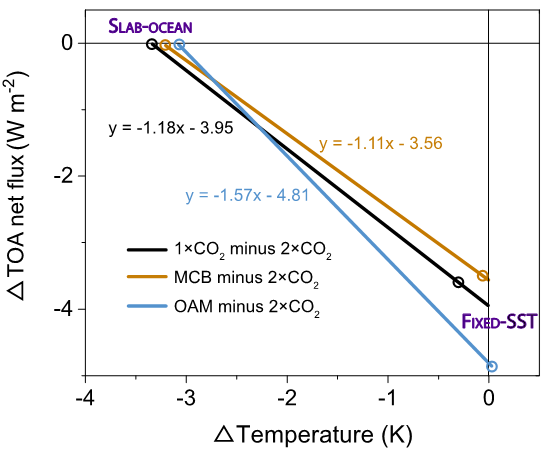Editor: 创高 Author: Time: 2021-02-25 Number of visits :224
To counteract anthropogenic CO2-induced global warming, various climate intervention approaches have been proposed. Among them, two approaches intend to reflect more sunlight back to space over ocean. One is marine cloud brightening that involves enhancement of marine cloud albedo. The other is ocean albedo modification that involves enhancement of ocean surface albedo. This study uses an Earth system model to compare climate response to these two climate intervention approaches. In our simulations, both approaches are designed to offset global mean surface warming caused by a doubling of atmospheric CO2. For the same amount of global cooling, ocean albedo modification produces a much stronger negative radiative forcing, implying that the forcing efficacy is smaller than that of marine cloud brightening. Under fixed sea surface temperature, fast climate adjustments, including changes in cloud and precipitation, differ substantially between these two approaches. This is mainly because ocean albedo modification reflects more sunlight from ocean surface, heating the lower atmosphere, but marine cloud brightening reflects more sunlight from cloud, cooling the lower atmosphere. When the climate system reaches a new equilibrium state after the adjustment of the atmosphere and upper ocean, these two approaches produce similar pattern of climate change.

Figure 1: Model-simulated changes in downward top-of-atmosphere net radiative flux against changes in global mean surface air temperature for the 1×CO2, MCB, and OAM cases relative to 2×CO2 from slab ocean simulations (circles on the left) and prescribed-SST simulations (circles on the right). The slopes of each line represent the climate feedback parameter. Intercepts on the right represent the effective radiative forcing at zero global mean surface air temperature change. MCB, Marine cloud brightening; OAM, ocean albedo modification.
This work was led by Mengying Zhao, a Ph.D. student at the School of Earth Sciences, Zhejiang University. Other authors include Prof. Long Cao at the School of Earth Sciences, Zhejiang University, postdoctoral researcher Lei Duan in the Department of global ecology, Carnegie Institution, Prof. Govindasamy Bala at Center for Atmospheric and Oceanic Sciences, Indian Institute of Science, and senior scientist, Ken Caldeira in the Department of global ecology, Carnegie Institution.
For details: Zhao, M., Cao, L., Duan, L., Bala, G., & Caldeira, K. (2021). Climate more responsive to marine cloud brightening than ocean albedo modification: A model study. Journal of Geophysical Research: Atmospheres, 126, e2020JD033256. https://doi.org/10.1029/2020JD033256
